The Phantom Goldendoodle is one of the rare patterns that appear in this type of crossbreed. They stand out from other Goldendoodles in terms of their fur shades, which is why they’re in high demand.
Phantom Goldendoodles are special because of the specific locations of markings that appear on the top of the primary colors.
Phantoms can come in a variety of shades, which are described in this article, along with other specific features of these adorable pooches.
If you’d like to know more about these unique pups, we are sure you will enjoy reading this article!
What Is A Phantom Goldendoodle?
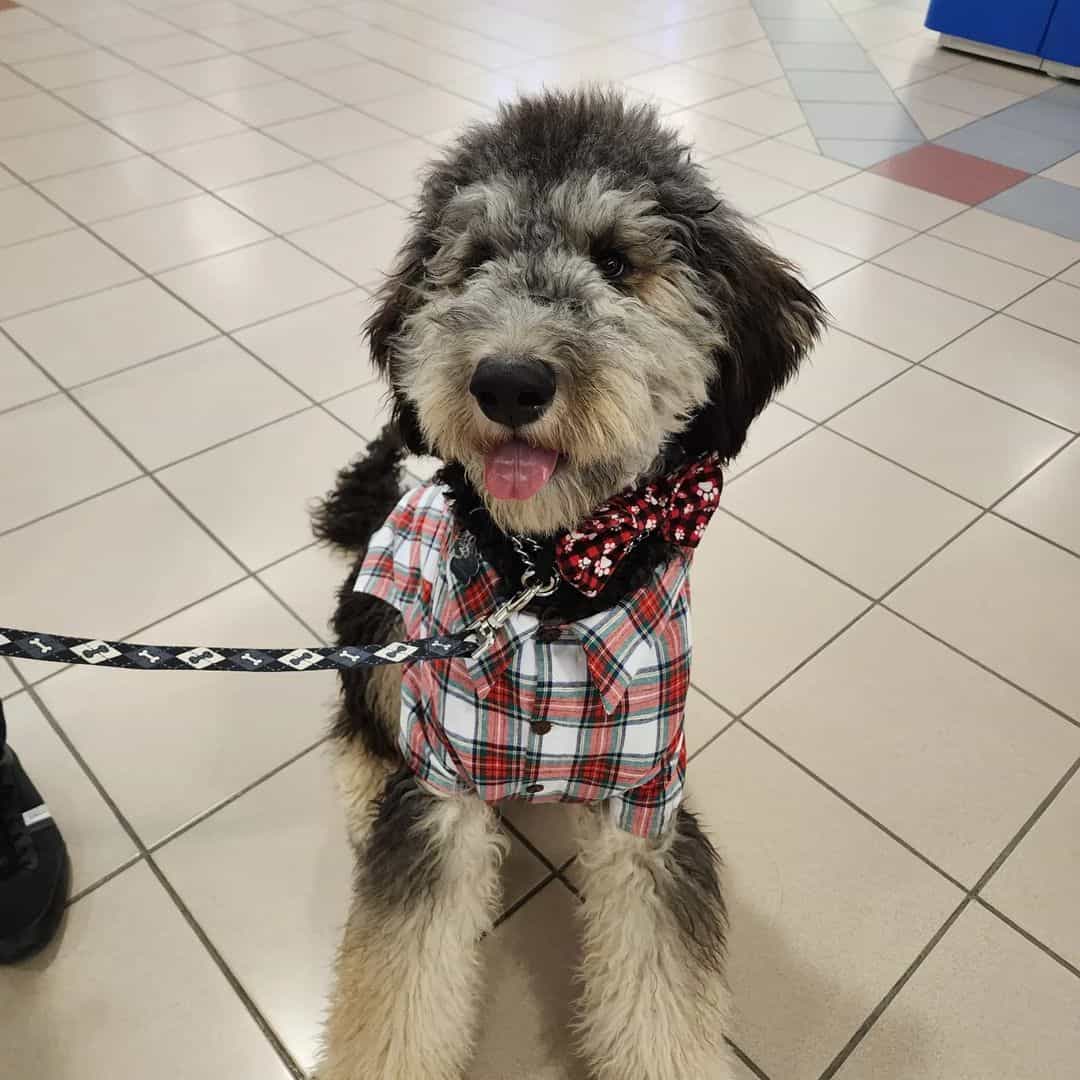
This is one of the most unique Goldendoodle patterns, which includes two different shades – one that serves as the base coat hue, and the other one that appears as patches all over the body.
The “phantom” in their name stands for the specific color combination of two hues – a solid one that serves as a background shade, and a color that appears in markings usually found on a canine’s legs, torso, muzzle, tail, eyebrows, and/or ears.
This type of pattern gives Goldendoodles a ghostly appearance… or better to say, irt makes them look like the “Phantom of the Opera”, although they’re not nearly as intimidating as this “creature”.
It’s interesting to notice that this color pattern isn’t related to any certain shade, which means that they can come in a variety of coat colors, including black, brown, apricot, cream, and other Goldendoodle colors.
The other name for this type of pattern is “Dobie markings” mostly because they resemble the shade combinations of doggies like Dobermans, Dachshunds, Yorkies, Manchester Terriers, etc.
RELATED: Doberman Colors: Explaining 9 Coat Color Options
Many people confuse phantom pups with tuxedo Goldendoodles because they share similar coat traits, although tuxedo doggies always have markings in the same places.
They are quite similar to the markings found on Tuxedo Goldendoodles, but with more precise requirements.
Types Of Phantom Goldendoodles
Phantom Goldendoodle puppies might appear in different colors that are categorized by the hues of the base fur.
Essentially, the shade that makes up the majority of a canine’s coat is referred to as the base coat, while the hue of the canine’s markings is regarded as a secondary color of the pet’s fur.
There are various shades of phantom Goldie Doodles, including black phantom pups (as the most common ones), and merle phantom doggies (as the rarest phantom Goldie puppies).
Here are the shade combinations that can be usually found in phantom Goldendoodles:
White Phantom Goldendoodle
These puppies are characterized by the special markings that are found in white color. White patches are usually located on the tail, legs, or head of the Goldendoodle.
White phantoms are generally medium-sized pups that can have either long or short fur, depending on the generation of the Goldendoodle or its genetic background.
Silver Phantom Goldendoodle
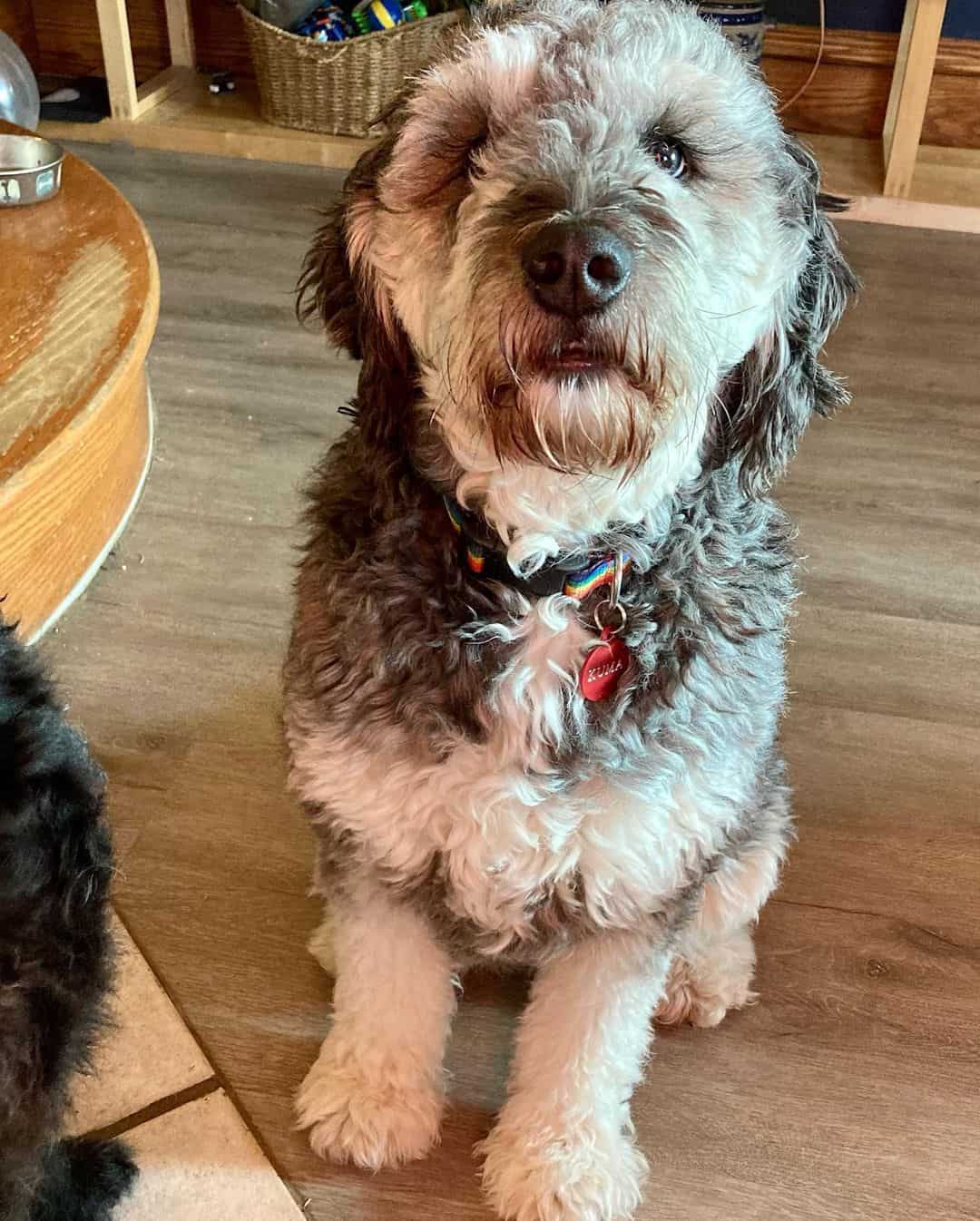
This might come as a surprise for some people, but silver phantom Goldie pups are quite common, especially since silver is considered a rare shade itself.
This type of Poodle mix usually has a silver hue as the base shade of the fur, with phantom markings that can be in almost any shade.
The most frequent coat shades that appear as secondary colors are either cream or white, but other hues can appear as well.
Black Phantom Goldendoodle
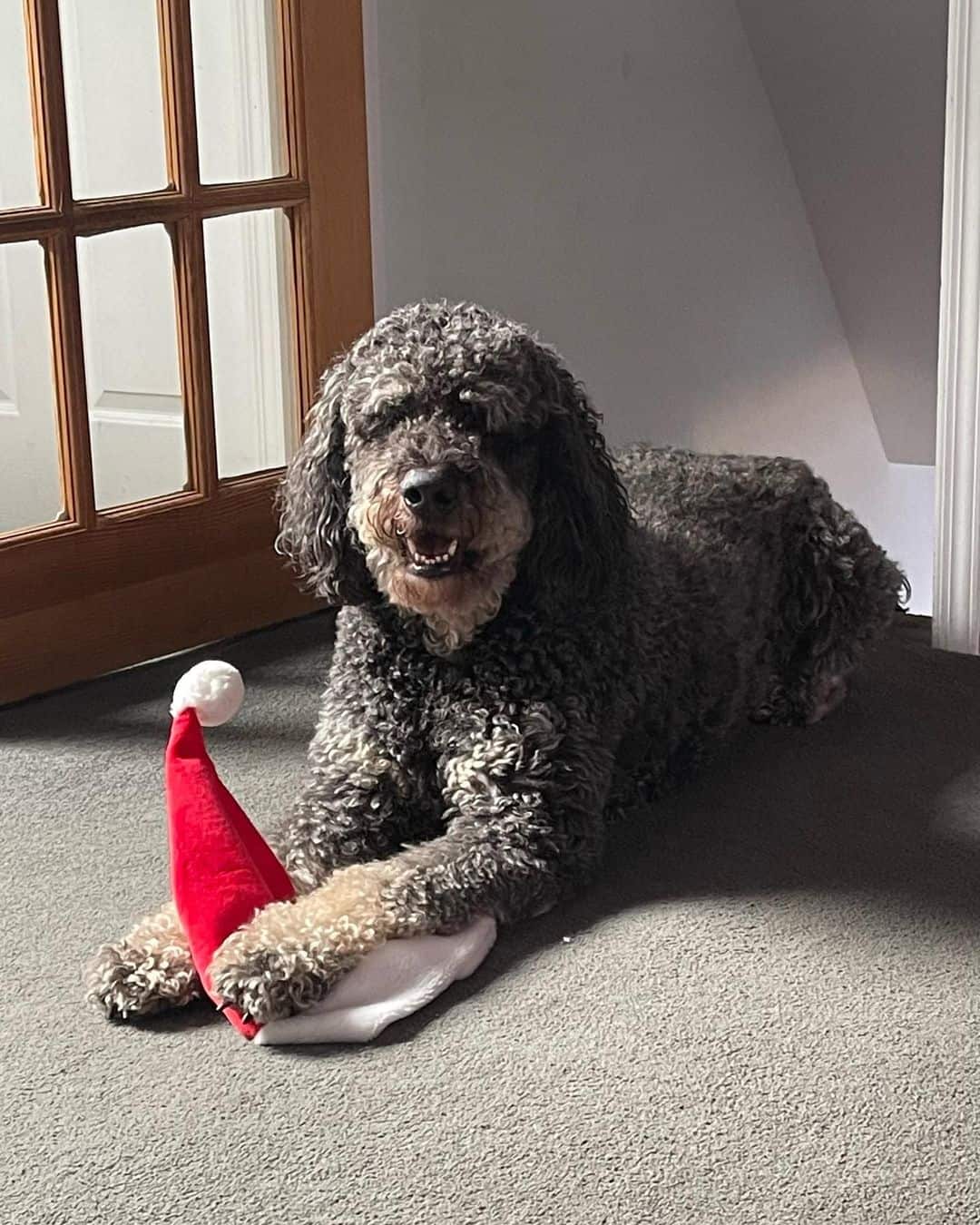
Solid black might not be a common shade among Goldendoodles, but when it comes to black phantom Goldendoodles, this shade is the most frequent one.
The shade of the base coat is always black, without any exceptions, while the markings can be found in different colors.
Just like in silver pups, black phantoms might have various shades as markings including red, tan, white, and others.
Essentially, any of the Goldendoodle shades might appear as secondary colors of black phantom pooches.
Sable Phantom Goldendoodle
This type of color marking is characterized by fur that has dark roots that get lighter at the tips of the hair.
Sable Goldendoodles appear with brown as a background shade, along with blonde, apricot, or reddish-brown hair ends.
Another color combination that might appear in the sable pattern is black and silver. Essentially, black fur gets lighter as hair grows toward the tips.
When it comes to phantom sable Goldendoodles, it can be said that the patterns that are described as phantom patches correspond to the shade of the tips and make them even more visible.
Sable phantom Goldendoodles are quite unusual and rare to find, which is why they’re more expensive and challenging to find than other breeds.
If you want to own a pup that will make everyone go “wow”, then the phantom Goldendoodle in the sable pattern will be the perfect choice.
Red Phantom Goldendoodle
This is one of the rarest shades of phantom Goldendoodles, which isn’t a surprise considering that this color isn’t easy to get among Goldendoodles in general.
Red Goldendoodles might not be as uncommon as red phantoms, but this type of coloration requires a specific method of breeding.
This type of phantom Goldendoodle is more difficult to find than its silver or black relatives.
When it comes to their markings, red phantom Goldie pooches are characterized by white, apricot, or cream patches that appear on a red background.
Red phantoms are more expensive than the majority of phantom Goldendoodles, which isn’t a surprise since they’re a rare but beautiful sight.
These pups are uncommon just because of their shade, which means that they won’t require any special treatment. You can groom them just like you would do with any other type of Goldendoodle.
Merle Phantom Goldendoodle
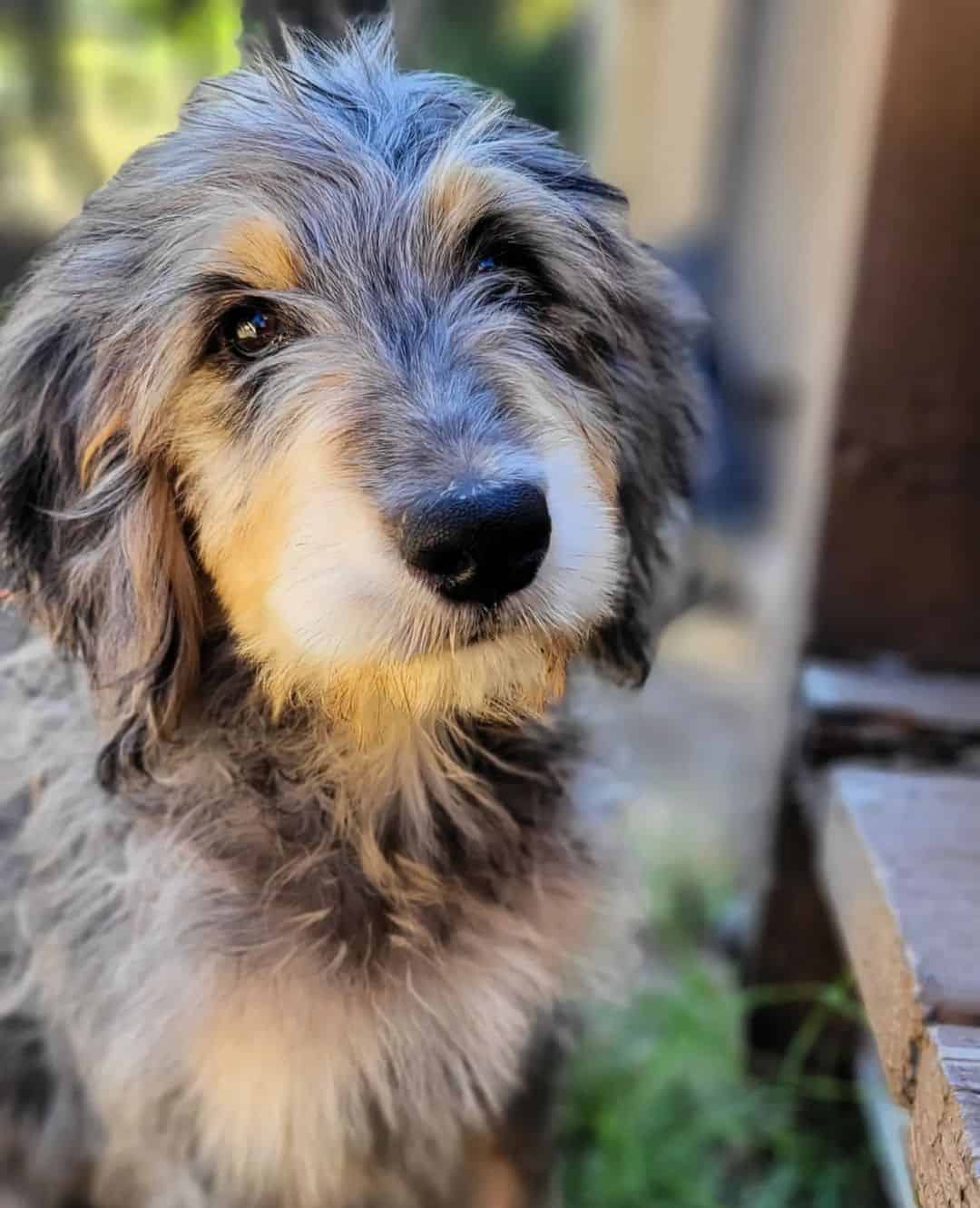
Merle phantom doggies are stars of the phantom Goldendoodles as they’re one of the most sought-after Goldie types on the market.
The majority of dog owners are astonished by their marble-like fur, which makes them look even more graceful and sophisticated.
Merle phantoms usually appear in shades such as sable, blue, and chocolate. This is an interesting mix of shades on the dog’s coat.
This is due to the fact that their one-of-a-kind marbled coat is breathtaking, and that this coat may exist in blue, sable, or chocolate merle variants.
This unique type of doggie is a result of breeding between a phantom pup and a Goldendoodle of a merle color pattern.
This breeding won’t affect the health of the Goldendoodle, like the mix of two merle pups. Instead, it will produce a canine with a stunning appearance that will turn heads wherever it goes.
In most cases, merle phantoms are colored in a blue, brindle, or chocolate merle base coat, with patches of apricot or light tan shades.
Because both phantom and merle Goldendoodles are so uncommon and in high demand, you might expect to pay a higher price for a merle phantom Goldendoodle than you would for a more common variety of these “ghostly” doggies.
One thing to keep in mind about merle Goldie Doodles is that they might resemble tri-colored or parti-colored doggies. This is important as many people tend to confuse the two, as they’re quite similar.
The best way to differentiate these two is to examine the fur as phantoms never come in more than two hues or patterns (in this case, a merle pattern, plus one shade for markings).
Chocolate Phantom Goldendoodles
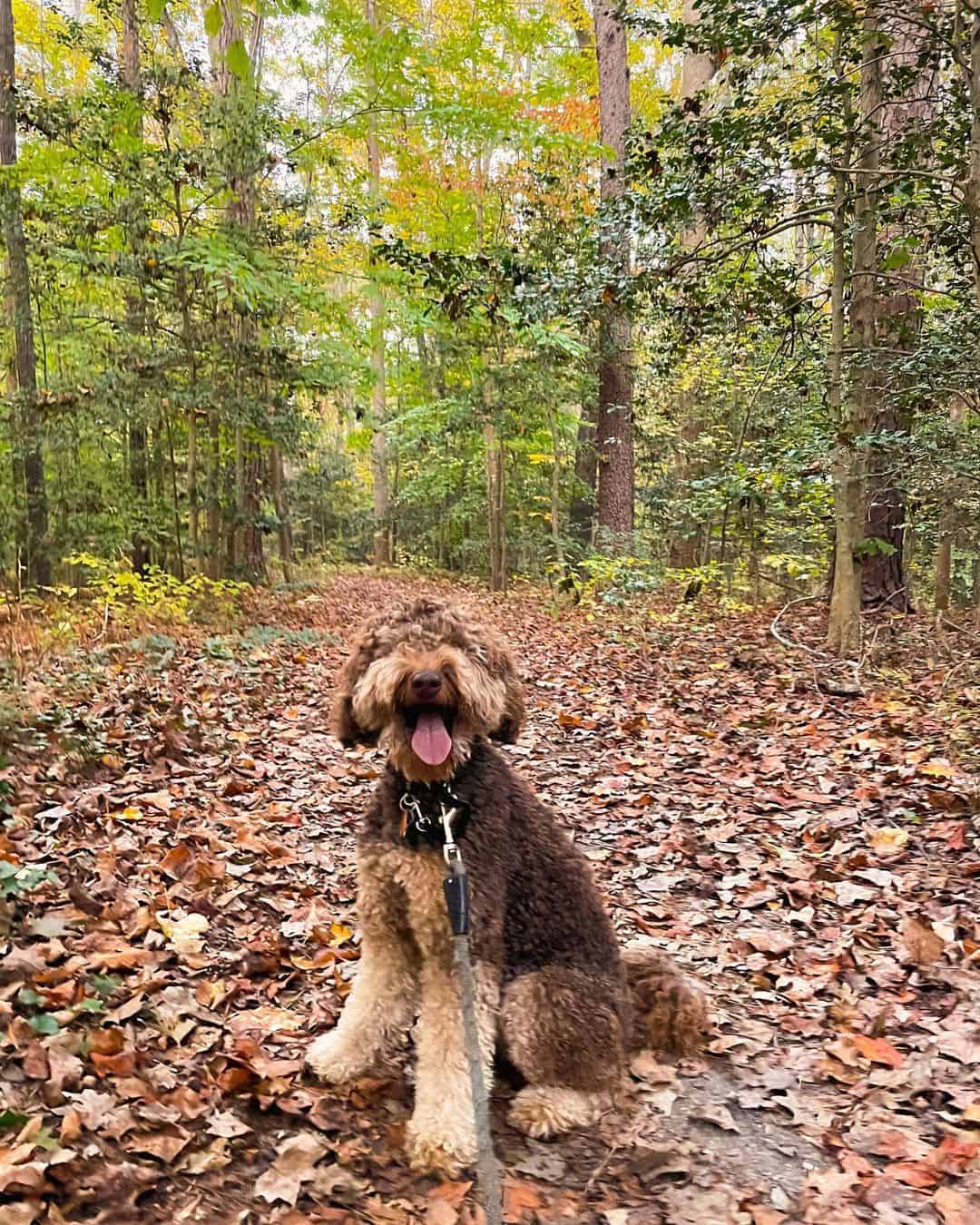
The majority of phantom Goldendoodles are considered quite rare as they require a specific type of breeding.
Choco phantom Goldendoodles are one of those uncommon types that are not easy to find, but are worth the wait because of their beautiful and unique coat.
These canines usually possess a coat that has chocolate (deeper brown) as the primary color, mixed with patches of lighter shades.
Just like in the majority of darker-shaded phantom Goldendoodles, the markings appear in light hues such as apricot, white, or cream.
The price of these pooches is similar to the price of red phantom Goldendoodles as they’re more difficult to produce. Some reputable breeders of Goldendoodles might specifically breed this type of Goldendoodle, but it won’t be an easy task finding them.
Brindle Phantom Goldendoodle
Merle phantoms might be “A-listers” among Goldendoodles of this specific pattern, but brindle phantom doggies are “tigers” – ones that have one of the most striking appearances.
The reason why some people might refer to them as tiger phantoms is the fact that they have striping over their solid-shade coat, which looks almost the same as tiger stripes.
The brindle pattern seen in Goldendoodles can be covered in a variety of shades including black, chocolate, silver, and red, which appear as stripes all over the fur.
The phantom marking is placed on the top of the brindle coat. Although they usually appear in the shades mentioned above, these phantoms can also have stripes that are just lighter hues of the brindle color.
Unfortunately, getting one of these phantoms will be the same as finding a needle in a haystack, so if you own one (or find one), you’re definitely a lucky one!
Are These Pups Uncommon?
The phantom coloring of Goldendoodles is what makes these dogs so rare to find, not only in the United States, but in other parts of the world as well.
In order for a Goldendoodle to meet the criteria for the phantom coat pattern, there are several parameters that must be met.
It is not possible to develop a Goldendoodle with a phantom type of marking without the presence of certain coat genes.
Since Goldendoodles have a large number of genetic variations for their coat patterns and shades, it’s not always easy to predict what kind of coat the puppies will be born with.
However, if you’re breeding a phantom Goldendoodle, it’s not hard to predict what kind of fur the litter will have, although the pattern shades might surprise you.
Which Sizes Do Phantom Goldendoodles Come In?
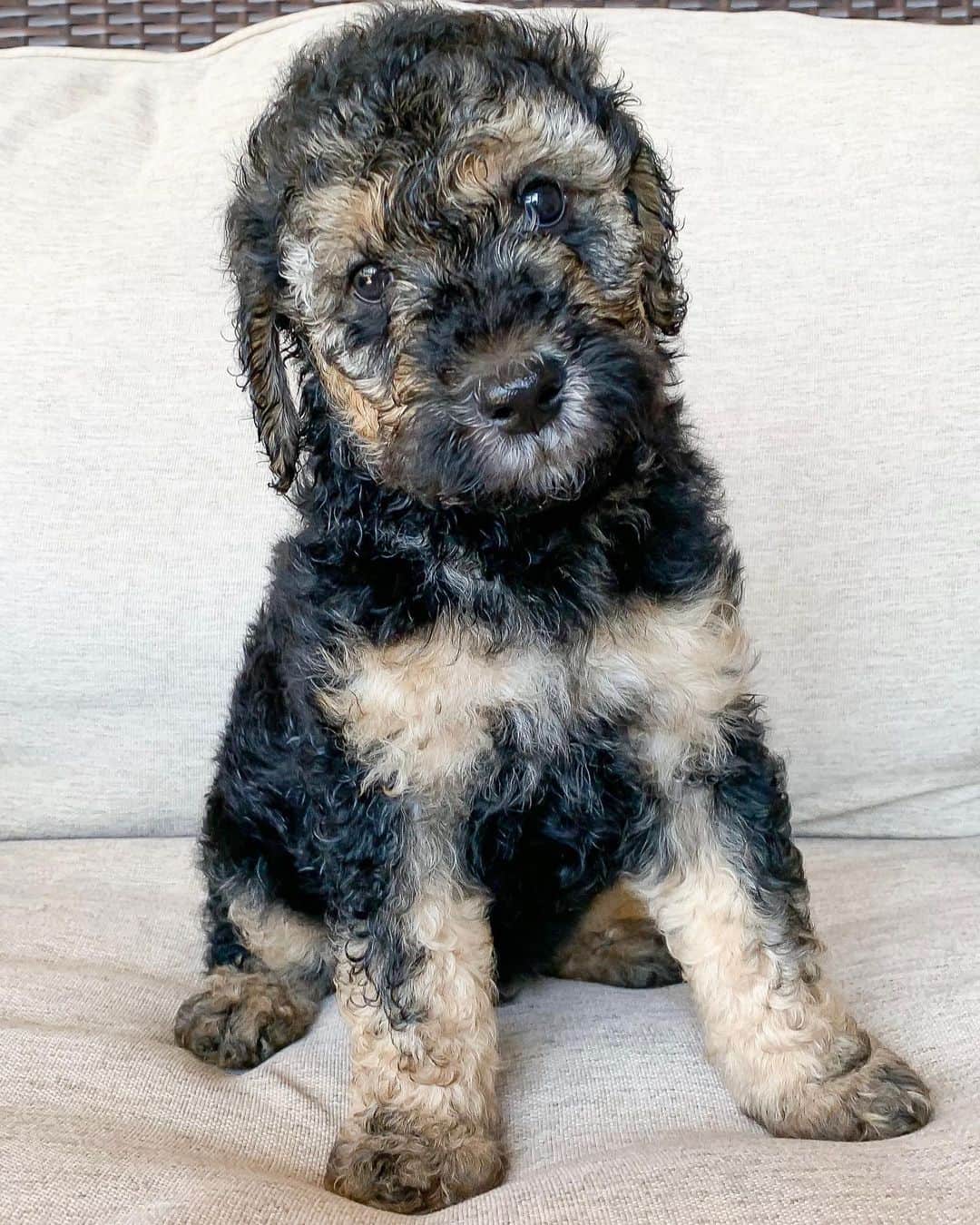
Phantom puppies are available in the same range of sizes as Goldendoodles in general. This includes toy, miniature, medium, and standard-sized Goldie Doodles.
However, although phantoms might appear in any of these sizes, the two most common phantoms are standard and mini Goldendoodles.
Let’s take a closer look at each size these Golden phantoms can come in:
• Standard phantom Goldendoodles are mixed-breed pooches that have a standard Poodle and a Golden Retriever as their parents. This breeding practice, of course, refers to F1 Goldendoodles.
READ NEXT: Standard Poodle Growth Chart: Keeping Track Of The Poodle’s Size
On the other hand, F2 Goldendoodles can be of standard size as well, but only if you breed two standard Goldendoodles.
This is the biggest of the four Goldendoodle varieties, which can reach anywhere from 50 to 90 pounds depending on the individual dog. At the shoulder, most standard Doods measure between 20 and 26 inches in height.
• Medium phantoms are Goldendoodle doggies that grow up to 21 inches – a size between standard and mini Goldies.
They can weigh anywhere from 35 to 50 pounds.
Because of this, the medium Goldendoodle is the ideal choice for people who don’t want a doggie that will grow to be too large, but also do not want one that will stay tiny throughout their whole life.
• Mini Goldendoodles are another type of pup that is a crossbreed between a Miniature Poodle and a Golden Retriever, which usually grows up to 17 inches tall, and weighs up to 35 lbs.
Minis are adorable puppies that are a great choice for a family pet as they don’t grow too big in size, but most importantly, they don’t shed as much as other mini doggies.
Of course, there might be exceptions among dog breeds, but since Goldendoodles are known as hypoallergenic canines, there are low chances that these pups will shed excessively.
• Toy Goldendoodles are of similar size to mini Goldie pooches, which is why they’re often confused. However, when you compare their measurements, you can see that toy pups are a few inches smaller than mini ones.
Toy doggies do not grow over 15 inches tall, and their weight does not exceed 20 lbs, which is at least 10 to 15 lbs less than that of mini pooches.
Goldendoodle Shades That Are Often Mistaken For Phantom Patterns
As we mentioned earlier, there are certain patterns that can be mistaken for a phantom type of coat, which isn’t a surprise, considering that Goldendoodles can come in a large range of shades and color combinations.
This is particularly relevant to individuals who are just getting started with this hybrid designer breed.
The parti- and tri-colored coat patterns of Goldendoodles are most likely to be confused for the phantom pattern. However, other Goldendoodle fur markings may also be mistaken for the phantom pattern.
The best way to recognize which shade and pattern certain Goldendoodles have is to learn the differences between them, which is why we dedicated the next few paragraphs to patterns that are similar to the phantom one.
Tri-Colored Goldendoodles
Tri-colored Goldie Doods have markings that are quite similar to the ones of the phantom puppies, which is why people often confuse them.
However, the main difference between these two patterns is the fact that tri-colored dogs, as their name says, have three shades on their fur instead of two, which is a requirement for phantom Doodles.
One of the most common shade combinations of tri-colored Goldendoodles is white, light tan, and black. This hue combination resembles the shades of Bernedoodle doggies.
Parti Goldendoodles
The fur of Goldie Doodles that are partially shaded comes in two hues – one of which has to be white in every case.
To be exact… at least thirty percent of the fur has to be white in order for a pup to be called a parti Goldendoodle.
That is exactly how parti pups differ from phantom Doods as phantoms don’t require white on their coat at all, although it might appear in some cases.
Are Phantom Goldendoodles Hypoallergenic?
Phantom Goldendoodles share a lot of characteristics with other types of Goldie Doods, which is why it can be said that they also have hypoallergenic traits.
Actually, the majority of Poodle mixes including Goldendoodles, Labradoodles, Aussiedoodles, Sheepadoodles, and other pups are considered low-shedding doggies.
However, this might not apply to all Doodles. Although straight-haired and flat-coated Goldendoodles shed less than the majority of other dog breeds, they shed much more than curly-haired Goldendoodles.
People who are allergic to dog hair and dander might own curly or wavy phantom Goldendoodles, but only if they have milder reactions.
However, I’d still recommend you consult with a health professional before you decide to get a pet, even if it’s a low-shedding dog breed like the Goldendoodle.
Are Phantom Goldendoodles Expensive?
Unfortunately, getting a phantom Goldendoodle is an expensive treat for a dog lover, but if you’re really a fan of these pups, we’re sure that the price won’t be the deciding factor.
When compared to a regular Goldendoodle, the price of a phantom Goldendoodle is almost twice as high. The main reason for that is the rarity of phantoms as they appear only on rare occasions.
Generally speaking, the cost of a phantom Goldendoodle may range anywhere from $3000 to $5000.
However, the prices may vary even more depending on which type of phantom Goldendoodle you would like to own. For example, a black phantom will have a lower price than a merle phantom Goldendoodle.
This is due to the fact that a black Phantom Goldendoodle is far more prevalent than, for example, a blue merle phantom Dood.
What Are Other Goldendoodle Colors?
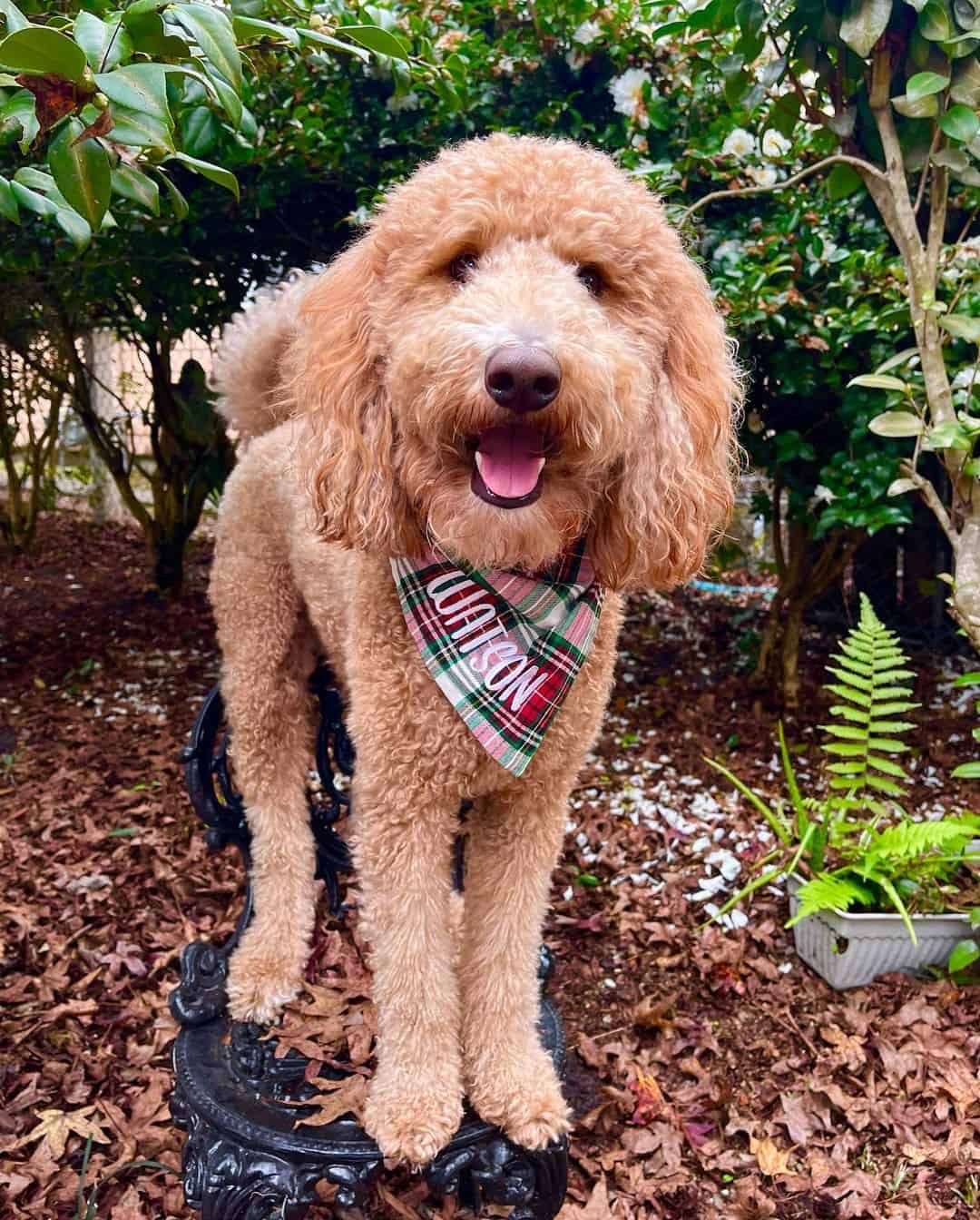
The American Kennel Club (AKC) acknowledges three distinct shades of gold in Golden Retrievers: dark golden, golden, and light golden. These are the standard shades for this canine type.
On the other hand, the AKC acknowledges eleven distinct hue varieties of Poodles as standard shades: blue, apricot, cafe-au-lait, black, silver, cream, red, gray, silver beige, white, and chocolate/brown.
When you combine these two canine breeds, the result is a Goldie Doodle pup that might appear in a wide variety of diverse fur shades.
There are also a number of “parti” Poodles and Golden Retrievers that can be passed on to generations of Goldendoodles despite the fact that the AKC does not accept these dog shades as standard.
In addition, there are dogs with uncommon coat colors, such as black Golden Retrievers, which is why it can be said that there is an almost endless number of possible color combinations for Goldendoodle fur.
In the end, it all comes down to the coat genetics of individual canines.
Apricot
Due to the fact that they resemble cute little Teddy bears, apricot Goldendoodles are one of the pups that are in the highest demand.
Poodles most commonly appear in two shades: black and white. However, other shades might appear as well, just like the apricot hue, which is considered one of the rare colors of this breed.
However, apricot Goldendoodles are still more common than merle Goldies, especially ones that include blue or red shades.
Brown
One of the most common and desirable fur shades for a Goldendoodle is brown. Therefore, you’ll often see these Teddy bear-like pups on the streets.
When we talk about brown, we’re referring to a shade that can range from dark walnut to a mahogany hue.
As a result of the fact that “Cafe-au-lait” is also an approved Poodle color, and seems to be brown, many Goldendoodles might appear in a shade similar to this one.
Are There Any Health Issues Related To Phantom Patterns?
Phantom Goldie Doodles do not have any health problems related to the shade or pattern of their coat… at least from what is currently known about this mixed breed.
Actually, when we talk about Goldendoodles and their health, it can be said that these pups are regarded as a healthy breed since they rarely show any signs of serious health issues.
However, that doesn’t mean phantom Goldendoodles can’t develop any medical condition as they can still inherit the health problems of their parent breeds.
Final Thoughts
Phantom Goldendoodles are indeed a very interesting type of Doodle that amazes a great number of Goldendoodle breeders, groomers, and dog lovers.
Although they might look completely different from other types of Goldendoodles, these pups have an equally-solid temperament, which makes them one of the best friends for any type of family.
If you’d like to own a phantom Goldendoodle, you will need to do a thorough search, but it will be worth it in the end.
READ NEXT:
Male Vs Female Goldendoodle – Which One To Choose?
Micro Goldendoodle: The Adorable Poodle Mix You Can’t Resist
